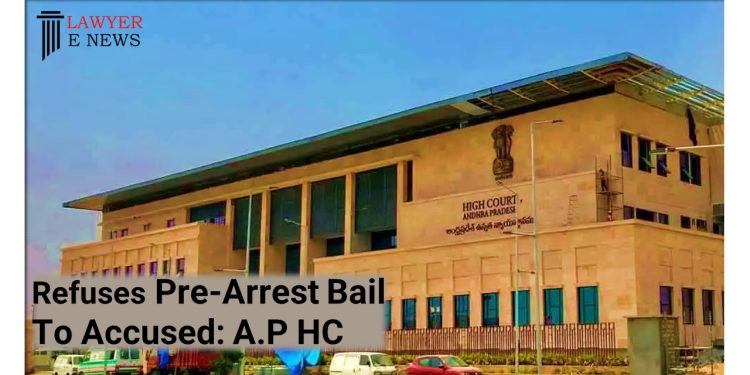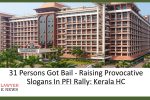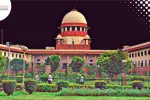Refuses Pre-Arrest Bail To Accused: A.P HC

D.D:04-07-2022
The Andhra Pradesh High Court denied pre-arrest bail to a man accused of “monitoring” a violent mob protesting the renaming of Konaseema District after Dr. BR Ambedkar via WhatsApp messages.
Justice Subba Reddy Satti observed that the petitioner’s name appeared in all of the complaints. Additionally, witnesses confirmed his presence. In light of the facts and circumstances of the case, as well as the fact that the Petitioner’s name appeared in the complaint and the list of witness statements recorded under Section 161 of the Criminal Procedure Code, the Court determined that the Petitioner is not entitled to pre-arrest bail and that his interrogation in custody is necessary.
It was alleged that, in violation of Section 144 of the Criminal Procedure Code and Section 30 of the Police Act, a large number of individuals gathered to protest the decision to rename the district in response to a call from the Konaseema Sadhana Committee. They were eventually joined by others and marched towards the collectorate. On their way, the mob allegedly threw stones at police officers who were performing their duties and burned a BVC college bus that was being used as a police transport vehicle. The mob also threw stones at police officers at the collectorate office, injuring several officers. The collectorate office and Ambedkar Bhavan had broken glasses. Later, the mob proceeded to the Red Bridge, where they damaged and set fire to two RTC buses. The mob then moved towards the residence of the MLA and threw stones, shattering some windows. When the MLA’s cousin attempted to intervene, the mob doused him with gasoline. He was able to flee. The mob broke into the residence of the MLA and set fire to the motorcycles, the furniture, and the residence itself.
The State asserted that the Petitioner, as the group’s leader, gathered his followers and supervised the entire mob via WhatsApp messages. It was argued that a prima facie case had been established against the Petitioner, making him ineligible for pre-arrest bail, based on the statements of the injured, the confessions of the arrested suspect, and the incident footage.
The Petitioner’s attorney asserted that his client was innocent and had never participated in the alleged offences. He argued that the incident occurred after the ruling party exacerbated the agitation and caused disturbances to tarnish the reputation of the other political party, as stated by the media and victims. He noted that the role of the Petitioner was not specified in any of the FIRs, which only list his name. He argued that, with the exception of the use of the word “mob,” no specific overt acts were attributed to any of the accused, including the Petitioner. When there are no specific overt acts attributed to a defendant, he argued, bail cannot be denied.
Additionally, he argued that the term “unlawful assembly” does not apply to the mob. In accordance with Section 141 of the IPC, an unlawful assembly is defined as a group of five or more individuals with the intention of committing a crime. It was argued that in the present case, the FIRs do not reveal any such common object or intention on the part of the mob, and when there is no such common intent, all those who were present at the time of the alleged incident cannot be charged. This renders the IPC’s Sections 146 and 147 inapplicable to the case.
Additionally, it was argued that Section 307 of the IPC would not apply to the Petitioner. The act of setting fire to buses while the drivers were inside cannot be attributed to the Petitioner unless the prosecution identifies him as the perpetrator. As evidenced by the videos, according to the Petitioner’s attorney, the drivers were not inside the bus when it was set on fire and the doors were wide open. He argued that it was not the intention of the mob to murder motorists, and that some criminals joined the mob and destroyed public property. Therefore, at most, violations of the Prevention of Damage to Public Property Act will result.
The counsel for the Petitioner asserted that Section 307 of the Indian Penal Code was added to the charges solely to deny him bail, since all other offences are bailable. In addition, he asserted that none of the 120 individuals arrested thus far were armed. He also noted that the police have not filed a petition requesting a detention for questioning. He further argued that Section 39 of the Criminal Code, which deals with the public’s duty to report certain crimes to the nearest magistrate or police officer, would not apply in the Petitioner’s case because he was unaware of the commission of the crime. He argued that the police were performing their duties at the time of the alleged crime, so even if it is assumed that the Petitioner was present at the time, he does not need to inform the police.
In response, the Additional Public Prosecutor argued that the evidence collected specifically demonstrated that the Petitioner, as a leader, played a significant role in inciting the mob. He observed the gang via WhatsApp. A prima facie case is established against the petitioner based on the statements of the injured, the confessions of the arrested, and the day’s video footage. He argued that when the mob set fire to the buses, it was aware that the drivers were inside, thereby constituting an attempt to murder in violation of Section 307. He argued that it may not have been the mob’s intention to kill the MLA, but they were aware of his presence in the house, and despite this knowledge, they set fire to the furniture and the house, thereby committing another offence under Section 307.
In addition to the confession statements of the co-accused, he argued that there are photographs demonstrating the petitioner’s participation in the crimes. He argued that the investigation was ongoing and that the Petitioner’s presence was required for a custodial interrogation to obtain call data of other suspects, to identify other individuals who participated in the crime, and to collect WhatsApp data. He claimed that following the incident, the Petitioner instructed WhatsApp group members to delete his instructions, thereby destroying evidence. There is a possibility that, if the Petitioner is released on bail, he will tamper with the evidence and influence the witnesses. The possibility of a conflict between the schedule community and the OC community was also mentioned.
The court noted that there must be an unlawful assembly, as defined by section 141 of the IPC, for sections 146 and 147 to apply. The Court found nothing in the evidence to indicate that all members of the mob shared a common intent to commit an offence. The court noted that despite the fact that the mob consisted of over one thousand individuals, no complaint indicated a common intent to commit an offence punishable under Section 307 of the IPC. The mob gathered at the collectorate office to submit their petitions, but not with the intent to commit a crime, and they were not armed. Moreover, the court determined that the Petitioner was not responsible for any overt acts.
The Court observed that the petitioner’s name was mentioned in all of the complaints. Additionally, witnesses confirmed his presence. In light of the facts and circumstances of the case, as well as the fact that the Petitioner’s name appeared in the complaint and the list of witness statements recorded under Section 161 of the Criminal Procedure Code, the Court determined that the Petitioner is not entitled to pre-arrest bail and that his interrogation in custody is necessary.
In a separate case, the High Court heard a bail application from an individual accused of committing similar offences during the same mob rally. The Petitioner argued that he had not participated in the disturbance and was not present when the offence occurred. The Petitioner had been held in remand since 30 May 2022, despite the fact that the Deputy Superintendent of Police had not requested his remand. It was asserted that the Petitioner’s involvement in the case was based solely on an extrajudicial confession made by another defendant.
The Special Assistant Public Prosecutor opposed the Criminal Petition on the basis that the petitioner and others were identified and arrayed in the Crime based on photographs taken by police at the scene of the offence. He also submitted a Memo declaring compliance with Section 15 A(3) of the SC & ST (PoA) Act.
Noting that the Petitioner has been in judicial custody for more than a month, the Court noted that the prosecution has not argued that the Petitioner’s presence is necessary during any custodial interrogation. The Court noted that since the investigation had reached its conclusion, remanding the Petitioner would be in violation of Article 21 of the Constitution of India. In the complaint, neither the petitioner’s name nor any specific attribution were made. The only basis for the Petitioner’s arrest was an extrajudicial confession. The Court cited Bullu Das v. State of Bihar, in which it was determined that an accused’s confessional statement was inadmissible because it was made to a police officer after the investigation had begun.
In light of the case’s facts and circumstances, the court granted the bail application.





